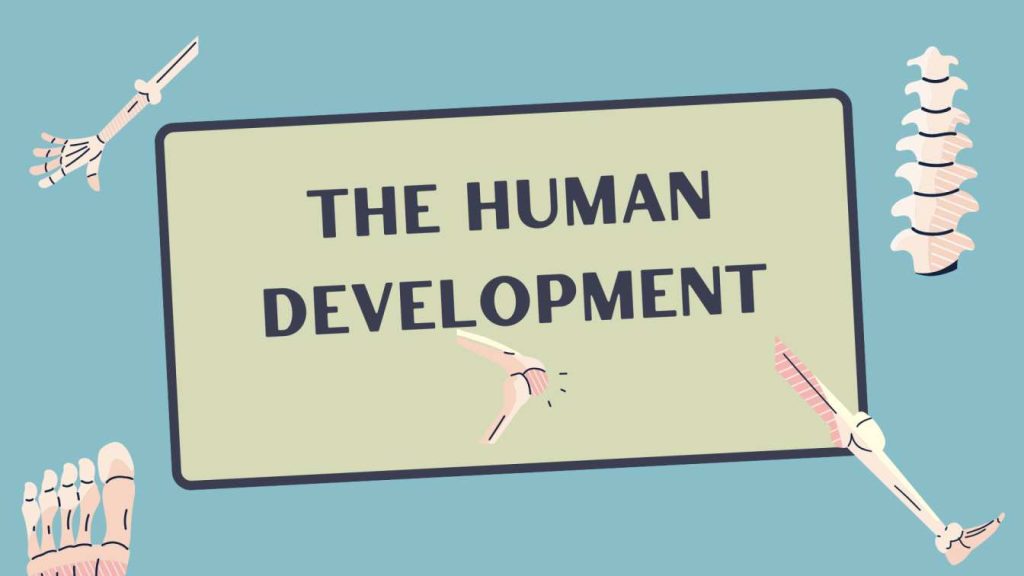
The nature vs. nurture debate is a long standing debate in psychology about the relative importance of genetics and environmental factors. Human growth and development is a complex and lifelong process that is influenced by variety of factors including genetics, environment and culture. Human development basically comprises 5 stages:
1. PRENATAL DEVELOPMENT
It is the first stage of human development. It is the process of growth and development of a fetus inside the womb. It begins at conception when a sperm fertilizes an egg, and ends at birth. It can be divided into three steps: Germinal stage, embryonic stage and fetal stage. Germinal stage lasts only about two weeks. During this time, the fertilized egg, called zygote, travels down the fallopian tube to uterus and implants into the uterine wall. The embryonic stage lasts from about three to eight weeks after conception where major organs and body system of the embryo forms. The fetal stage lasts from about nine weeks after conception until birth.
During this stage, the mother might face prenatal stress, prenatal depression, anxiety. Mothers who are victim of domestic violence are more likely to have premature birth, low birth weight and babies with developmental problems. Here are some tips for preventing psychological issues and hazards during this stage:
- Get regular prenatal care
- Eat a healthy diet
- Get regular exercise
- Avoid substance abuse
- Seek professional help if needed
2. INFANCY
Infancy is the stage of human development from birth to about age 2. During this time, babies grow and develop rapidly, both physically and mentally. They tend to gain weight, height and their muscles and bones become stronger. They start rolling over, crawling, walking. Babies also experience rapid cognitive development and socio-emotional development. Some of the psychological hazards that can occur during infancy are:
- Attachment disorders: It is a mental condition that can occur when a baby does not form a strong attachment with their cargiver.
- Separation anxiety: Babies with severe separation anxiety may have difficulty being apart from their caregivers.
- Postpartum depression: It is a type of depression that can occur after childbirth. It can have effect on both the mother and baby.
To prevent the psychological issues;
- Provide a safe and loving environment
- Respond to baby’s needs
- Bond with your baby
3. CHILDHOOD
It is the period of life from end of 2nd year to adolescence. During childhood, children learn to move around, communicate, interact with their environment and develop their own sense of identity. Children are curious about the world around them and eager to learn new things. This is a time of great exploration and discovery. Some of the psychological issues and hazards that can occur during childhood are as follows;
- Anxiety disorders: They are characterized by excessive worry, fear and apprehension. Anxiety disorder can interfere with a child’s ability to function in school, home and friends.
- Mood disorders: Mood disorders, such as depression and bipolar disorder can also occur in children.
- Conduct disorder: It is a behavioral disorder characterized by aggression, defiance and rule breaking.
Some tips for preventing psychological issues are as follows:
- Be responsive to your child’s needs
- Set clear expectation and boundaries
- Encourage your child to talk to you
- Teach your child coping skills
4.ADOLESCENCE
Adolescence is the transitional stage of physical and psychological development that generally occurs during the period from puberty to adulthood. It is usually associated with teenage years but its physical, psychological or cultural expressions may begin earlier or end later.
Some of the common psychological issues during this stage are as follows;
- Anxiety disorders: They are characterized by excessive worry, fear and apprehension.
- Eating disorders: It is a mental health disorder characterized by unhealthy eating habits and a distorted body image.
- Self-harm: It is the intentional infliction of pain or injury to oneself.
Here are some tips for preventing psychological issues;
- Communicate openly and honestly with your child
- Provide a safe and supporting environment
- seek professional help if needed.
5.ADULTHOOD
It is a period of human life that begins after adolescence and continues until death. During this stage, adults typically take on new roles and responsibilities, such as starting a career, getting married and having children. Adults may experience major life events like job changes, divorce, death of loved ones.
Here are some of the psychological issues adults may experience;
- Stress: Stress is a normal part of life, but it can become a problem if it is chronic or severe.
- Relationship problems: They may experience relationship problems with friends, family, children or loved ones.
- Work- life balance: It can be a challenge for many adults.
Here are some tips for preventing psychological issues:
- Take care of yourself
- Build stronger relationships
- Seek professional help if needed
For more information related to management: https://www.tudoms.org/
